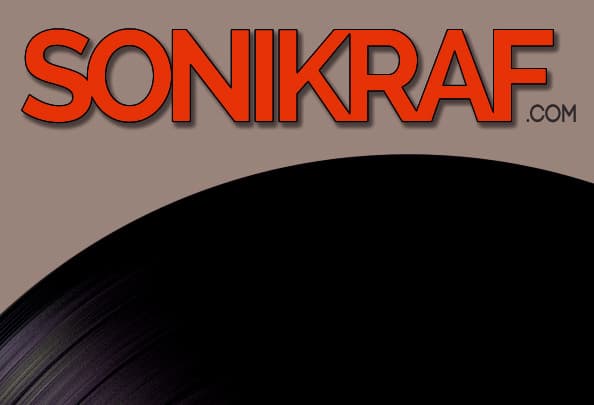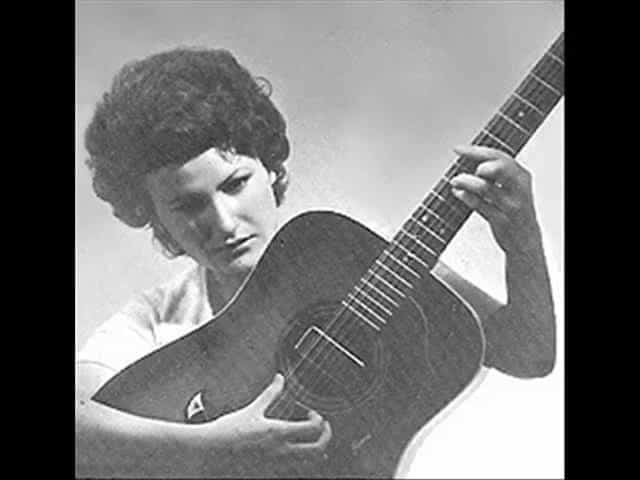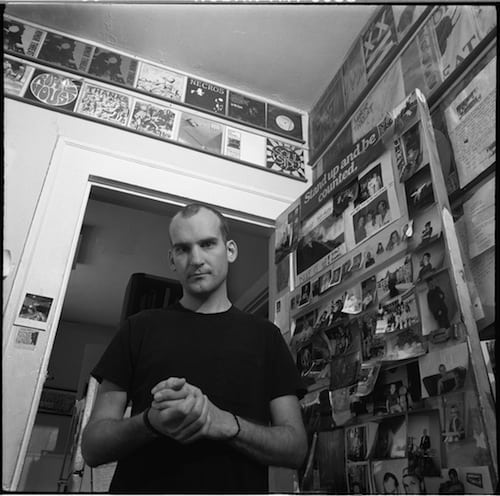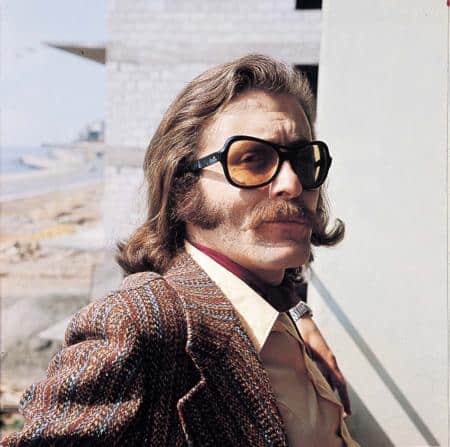Searching for new music? Look no further! A group of independent musicians in Istanbul have launched Sonikraf.com, a site featuring reviews and links to the music of local groups. You can listen to these groups, read about them and learn more about their gigs. The site will also sponsor shows around the city. I had the chance to speak with the core team members of Sonikraf: Matt Loftin, Utku Öğüt, Alper Erkut, Gabriel Clark and Paul Osterlund. They discussed their plans for the site as well as what “do-it-yourself music” means to them.

Matt, how did you get the idea for the site? How did you convince other contributors to take part?
Matt: I know a lot of different people doing really amazing things [when it comes to music in this region]. I thought it would be really nice to have a place where all of this could be viewed and appreciated in both English and Turkish. This way, bands that play at Peyote or somewhere could get noticed by someone in Greece who wants to book them in Athens. I also have selfish reasons; I want to know what everybody is listening to.
Gabriel: What really got me was this idea of linking with other sites. I think this was how you sold it to me. It would be one tiny piece of an entire network of other sites.
The landscape of the music scene is insane. There’s so much. I’ve discovered at least two awesome bands from Sonikraf already that I’m listening to regularly.
Matt: I hope it will reflect the spirit of the independent scene here.
What can users expect to see when they visit the site?
Matt: Every article about a band on the site has to have some kind of link to a YouTube page, a Bandcamp page, a Soundcloud page, etc. If they don’t have something online, we can host an mp3 for them, though it’s always better for the band to have their own online presence.
Also, bands in Turkey will be tagged by city so that we can get people writing in Ankara and Eskişehir and İzmir. I know those places definitely have music scenes. Adana also has some things going on.
Gabriel: Good hip hop.
Oh really? Hip hop in Adana?
Utku: Yeah, I’m a big fan of it.
Matt: We’re hoping to find contributors in those towns and other places who want to put something up about what’s going on their respective areas. Also, anyone who uses the site, not just contributors, can upload gig posters with event information. It would be awesome to see people post events happening in other towns.

You’ve mentioned that you want Sonikraf to focus on ‘do-it-yourself’ or DIY music. Could you explain the DIY concept?
Paul: The main goal is to form a scene based on the contributions of you and your friends without the help of corporate structures or financial backers. In this case, creating a musical community that’s based on musical support and the appreciation and the passion of doing your own art on your own terms.
Matt: It’s basically admitting that not everybody grows up to be a rock star. At the same, you can still play music, have a really good time, and work with talented people.
Paul: And they’re not going to act like freaking rock stars; they want to meet you and talk to you.
Utku: DIY culture is also something that you do within your own means. For example, if you want to record your music, you have to pay for a studio. You have to pay for the workforce that is involved with the studio or production company, etc.
I tried to record an album with two producers and I paid them. They didn’t give me the outcome that I wanted and they also tried to impose mainstream standards on the music. So, I spent time learning how to record music. Then, I bought some equipment and I did the recording at my home. My album was recorded partly at home and partly in our humble collective studio, Ses Apartmanı.
Matt: You’re beholden only to yourself. It’s more about music, friendship and collaboration. Hopefully, you reach some kind of greater whole through the parts.
Alper: DIY should not be seen as strictly a ‘music thing.’ It’s about self-sufficiency. Someone who wants to fix their roof can do it themselves, for instance.
Actually, DIY is intertwined with the ethic of punk culture.
Could you describe the relationship between punk and DIY?
Alper: As we know, punk came to the forefront with the uprising of the working class. We could say it’s a culture created by real salt-of-the-earth people; people who make do with what they have. So, in punk culture you do everything yourself—make fanzines, organize shows, make posters, distribute flare—everything. All of that started with punk.
Matt: I think that things in the ’60s were kind of DIY, as well. In the ’60s, independent radio stations could be approached by independent musicians and promoters. I don’t know that many of those bands really thought that they were going to be rock stars. They wanted to play at a party and get a girlfriend. They wanted to drink beers and have a good time.
Punk was a kind of return to that. It wasn’t about trying to do something that sounded like what was popular, so that you could be popular as well. I mean, the whole punk ethic was a rebellion against the ‘70s stadium rock culture in which all people cared about was going to these massive shows.
Paul: Do you know the bands Fugazi or Minor Threat? They were my heroes when I was a kid. When I was 14 or 15, I wrote a letter to Ian MacKaye, who was the singer of both bands. I was a little kid and I wrote him a handwritten letter asking, ‘What do you suggest to musicians? What should I do?’ And I got a postcard back from him a few months later. He actually threw a postcard in a typewriter. I still have the postcard and I’ll never forget what he said: ‘Do what you do and no matter what result happens, just know that you had fun doing it and remember that you enjoy doing it.’
That’s the point. It’s not about what happens later. It’s about what happens now. We’re doing this because we like doing it now. ‘Now’ means the rehearsal or the recording or the show. Whatever we’re doing now, we’re doing it because we like doing it right now.
Utku: Like John K said, ‘This moment is now.’ Music is all about moments.

How does the availability of space and resources affect bands in Istanbul?
Paul: Living in mid-sized American cities — where it’s possible to have a house with a basement and a car — you have your own equipment and you can go down to your basement and practice, and if you want to do a recording, then you just set up a temporary studio in your basement and you can record as long as you want. Or if you’re going to a show, you throw your own equipment in your car and you drive it ten minutes to the show. None of that’s possible here.
Gabriel: That’s so different from England…
Paul: Here, if people have their own equipment, you can’t transport it easily. Or if you want to do a recording, you have to book time and it’s not cheap. If you want to practice, you can’t just go down to your basement and play for, like, four hours. You have to book studio time a few days in advance, which you’re paying for by the hour, so it’s completely different from what I was used to.
Matt: Even acquiring equipment is much more expensive here.
Paul: The taxes for musical gear are through the roof. So, you can’t buy anything here. I never buy gear here. I wait to go back to the States. I bought a guitar in the States last year. The same guitar is twice as much here. It’s $300 but would have cost €500 here.
Matt: So, that’s actually an impediment to making quality recordings here. You go to a studio because you hope the studio has good equipment. We talk with friends about the studios we play at and say ‘They’ve got this amp’ or ‘They’ve got that amp.’ They don’t always have everything you want but sometimes they’ll have something that’s good, like a better drum kit or whatever.
Utku: On lots of albums, if they like the drums at a certain studio, they go to that studio and record the drums there. They like the amps at a different studio, so they go to the other studio. They export the files to continue recording there. (laughing)
Gabriel: It’s a cheaper way of doing it.
Matt: For studios here, also, space is at a premium. I know that’s a different thing for me. In Houston, this guy built his studio out of a warehouse. He’s got isolation rooms — it’s great.
Gabriel: In the States you’ve got loads of space because land’s much cheaper.
Matt: Right, but here the biggest studios I’ve seen are smaller than this apartment. And that really changes the acoustics and everything.
That has to do with performance venues as well. They usually have pretty good equipment and they’ll have it at the venue. But making sure that you have the tone that you want to have depends on what they’ve got at the venue.
Gabriel: In terms of live music, sound quality is always really important. But the most important thing is the support and encouragement you get from the venues, which is what makes the scene. People who are genuinely interested. This is what it’s all about.

So, would you say that the music community is supportive here?
Utku: To be honest, we are very supportive of each other. If someone makes music, keeps on doing it and loves what he does, he makes music very well. In time some relations will develop between bands. Collaborations. If any member of a band behaves like a jerk, everyone is clear with him because we are all under the same circumstances: lack of resources and lack of investment. So, we have to join forces.
Matt: We’re not necessarily lacking investment, we just don’t need it. (laughs)
Utku: For example, one of the guys from a band I know is a really cool, talented guy. He asked me for help producing his last album. I did it without charging anything. I just told them to bring six packs of soda before coming over. But if he had behaved like a jerk to me, our collaboration would have ended. He wouldn’t do that, though.
Matt: Also, many projects get facilitated through networking.
Utku: And everyone is playing with each other.
Matt: Alper, how many groups do you have?
Alper: Nine! (laughs)
Matt: Everybody’s got different projects. And it’s just really incestuous and so much fun.
You can read Part 2 of this interview here.
Utku Öğüt has been playing in many kinds of bands around Istanbul for years. His main project at the moment is Kutu.
Alper Erkut is a musician and promotor. He is involved in several bands including Foton Kuşağı and Indefinite Time Period. He also runs the record label Byzantion Records and the music collective Tight Aggressive.
Matt Loftin is the lead organizer of Sonikraf. He plays bass and is also involved in the bands Kutu and Foton Kuşağı. He hosts a radio program on Thursdays at 20:00 on StandartFM.
Gabriel Clark has been here since 2004. He’s an English teacher and has been active in the music scene here since he arrived with his projecst Chorni, Camphor, and his old project Pis Yabanci.
Paul Osterlund has lived in Istanbul for over four years. He is a journalist/writer and plays in Foton Kuşağı and Ferforje. He loves to wander the city alone.










[…] You can read Part 1 of this interview here. […]
Sounds very exciting! Congratulations to the Sonikraf team for this initiative!
[…] Istanbul expat website yabangee.com is running a series of articles about sonikraf.com, a music website I designed through my company Semiocity for an Istanbul-based […]
[…] those unfamiliar with the important work being done, check out last year’s interview with the Sonikraf […]